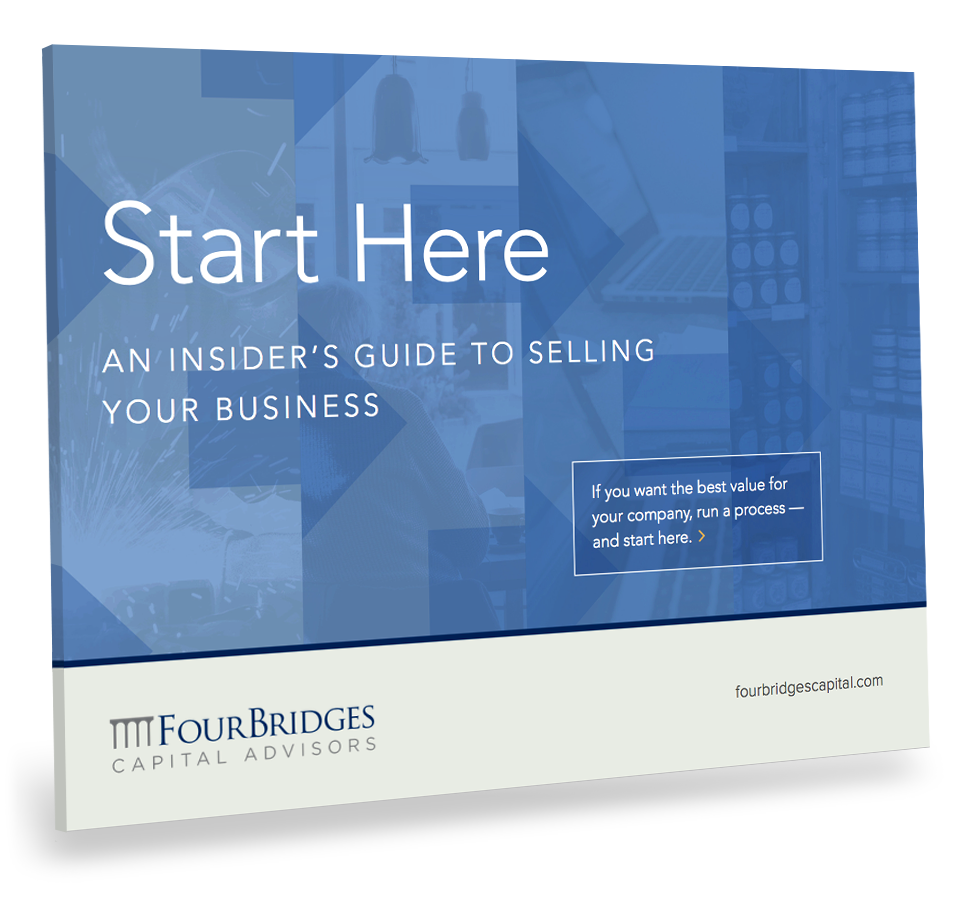RESOURCES
Your questions, asked and answered.
Before you decide to sell your business, you’ll have questions. If yours isn’t answered here, type it into the field below, or drop us a line on the contact page.
HOW LONG DOES IT TAKE TO SELL A COMPANY?
6 to 9 months.
That’s a typical range, but it can be shorter or longer, depending on the state of the company’s financial statements.
WHY DO BUSINESS OWNERS USE AN ADVISOR TO SELL THEIR COMPANY?
It’s not like selling a car or a house: there’s a lot more at stake.
Most owners sell a business once in a lifetime. Larger corporations and private equity funds buy companies frequently. In fact, some PE funds might make 5 to 10 acquisitions in one year. That means they’re experts in buying — so you need an expert to represent you when you’re selling.
HOW DO BUYERS DETERMINE WHAT A BUSINESS IS WORTH?
The biggest factor typically involves some “multiple” of a company’s “Adjusted” EBITDA.
EBITDA stands for Earnings Before Interest, Taxes, Depreciation and Amortization). Adjusted EBITDA is a close approximation of the available cash generated by the business before paying debt service and taxes. It’s calculated by adding back such things as excess owner compensation and non-recurring expenses.
WHAT IS A CIM?
CIM stands for Confidential Information Memorandum.
It’s a document that describes a business, its industry, customers, employees, history and financial performance.
WHY DO I NEED AN ADVISOR IF I'VE ALREADY BEEN APPROACHED BY A POTENTIAL BUYER?
Because when you negotiate with a single buyer, there’s no pressure to pay full value for the business.
Think about it this way: when you’re selling your house, it’s best to have multiple offers, so that you can choose the highest bidder. The same goes for selling your business.
I HAD A VALUATION REPORT DONE FOR MY COMPANY. IS THAT WHAT I CAN EXPECT TO GET IF I SELL IT?
Maybe. “Valuations” are useful for estate planning and other situations, but real value is determined by what a willing buyer offers to pay a willing seller.
We’ve conducted sales processes where the range of offers went from $5 million to $9 million for one company, and from $16 million to $36 million for another. If an acquirer perceives there is near-term strategic value in a company and there are competing offers, they will often stretch on valuation.
WHAT SHOULD I KNOW ABOUT A LETTER OF INTENT?
It’s a proposed offer for your company, but it’s not firm or binding.
Let’s stick with the real estate example: an LOI is like making an offer on a house. You’ve put a number on it, but there’s no guarantee you’ll make it to closing. The terms of an LOI are based on all of the information that a buyer has received about a company. Once an LOI is accepted, the buyer will enter a Due Diligence period to confirm that all of the information they have received is, in fact, accurate.
WHAT IS DUE DILIGENCE?
A process that a buyer undertakes once they’ve submitted an offer, or an LOI (see above).
Using third-party legal, financial and operational experts, the buyer performs a “house inspection” to confirm that 1) all the information on which they have formulated their offer is accurate (financial statements, tax returns, etc.); and 2) there are no outstanding issues or potential land mines that a new owner might have to deal with post-sale.
WHAT IS EXCLUSIVITY?
It’s like getting engaged: you’re pretty sure the wedding is happening, but you just never know.
Once a buyer and seller agree on the terms and structure of an offer, the buyer asks for a period of time to conduct Due Diligence (see above), prepare legal documents, develop transition plans and typically secure financing. During this time, since the buyer is spending time and money on attorneys, accountants, etc., they require the seller to commit not to negotiate with any other party. Buyers can ask for as long as 90 days for the exclusivity period, and sellers prefer 30 days. This is a negotiating point, so it usually ends up somewhere in the middle.
